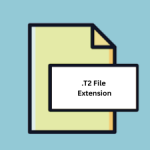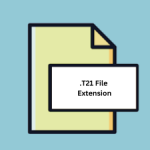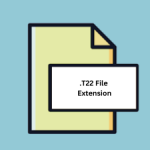.FFINDEX File Extension

FFmpegSource2 Media Index
| Developer | N/A |
| Popularity | |
| Category | Data Files |
| Format | .FFINDEX |
| Cross Platform | Update Soon |
What is an FFINDEX file?
Files with the .FFINDEX extensions are associated with FFmpegSource2, a popular media handling framework primarily used for video and audio processing tasks.
The .FFINDEX file serves as a media index, providing essential metadata and information about media files to facilitate efficient access and manipulation.
More Information.
The introduction of the .FFINDEX file extension was a strategic move to enhance the performance and usability of FFmpegSource2.
Historically, media processing tasks often required extensive parsing of media files, leading to inefficiencies, especially with large datasets.
The primary purpose of the .FFINDEX files were to serve as a precomputed index, storing essential metadata and structural information about associated media files.
This indexing mechanism significantly expedited tasks such as seeking, editing, and extracting specific segments from multimedia content.
Origin Of This File.
The FFmpegSource2 project emerged as an open-source initiative aimed at providing a comprehensive solution for multimedia processing.
Developed by various contributors within the multimedia community, FFmpegSource2 gained prominence due to its versatility, robustness, and support for a wide range of media formats.
The .FFINDEX file extension became part of FFmpegSource2’s ecosystem to address the need for efficient indexing and accessing of media files during processing.
File Structure Technical Specification.
The structure of .FFINDEX files is designed to efficiently store metadata and indexing information in a format that is easily accessible during media processing tasks. While specific details may vary based on implementation and version, typical components of .FFINDEX files include:
- Header: Contains essential information about the index file, such as version number, encoding scheme, and any additional metadata.
- Index Entries: Each entry corresponds to a segment or keyframe within the associated media file. These entries typically include timestamps, byte offsets, and other metadata necessary for precise navigation and retrieval.
- Metadata: Optionally, .FFINDEX files may include additional metadata relevant to the media content, such as codec information, resolution, duration, and more.
How to Convert the File?
Converting .FFINDEX files may not be a common task, as they are primarily used as index files within the FFmpegSource2 framework. If you need to convert or extract data from .FFINDEX files for specific purposes, you can follow these general steps:
1. Using FFmpeg or FFmpegSource2:
- Install FFmpeg: If you haven’t already, download and install FFmpeg, a powerful multimedia processing tool available for various operating systems.
- Extract Data: You can use FFmpeg to extract data from .FFINDEX files by specifying the input .FFINDEX file and the desired output format or codec. Consult FFmpeg’s documentation or community resources for guidance on utilizing its features for this purpose.
2. Custom Scripts or Programs:
- Develop or Find Conversion Scripts: Depending on your specific requirements, you may need to develop custom scripts or programs to convert .FFINDEX files. Programming languages like Python, along with libraries such as FFmpeg or FFmpegSource2 bindings, can be utilized for this purpose.
- Extract Metadata or Keyframe Information: Within your custom script, extract metadata, keyframe information, or other relevant data from the .FFINDEX file. You can then process this data as needed, potentially converting it into a different format or structure.
3. Open Source Tools or Libraries:
- Explore Existing Tools: Search for existing open-source tools or libraries designed for working with FFmpeg or FFmpegSource2. These tools may offer functionality to handle .FFINDEX files directly or provide insights into how to develop your conversion solutions.
- Contribute or Extend: If you find a tool or library that partially meets your needs, consider contributing to it or extending its functionality to support .FFINDEX file conversion. Open-source projects often welcome contributions and collaborations from the community.
Advantages And Disadvantages.
Advantage:
- Improved Performance: .FFINDEX files enhance the performance of media processing tasks by providing quick access to essential metadata and structural information.
- Efficient Seeking: With indexed information readily available, seeking to specific points within a media file becomes significantly faster and more accurate.
- Streamlined Editing: Media editing applications can leverage .FFINDEX files to streamline operations such as trimming, splitting, and joining multimedia content.
Disadvantage:
- Dependency on FFmpegSource2: .FFINDEX files are tightly coupled with FFmpegSource2, limiting their compatibility with other media processing frameworks.
- Storage Overhead: Maintaining .FFINDEX files alongside media content can consume additional storage space, particularly for large datasets.
How to Open FFINDEX?
Open In Windows
Windows users can open .FFINDEX files using multimedia processing software that supports FFmpegSource2 framework, such as:
- FFmpeg: FFmpeg is a command-line tool, but there are various graphical user interface (GUI) applications built around it that simplify its usage on Windows, such as FFmpeg GUI or WinFF.
- Media Editing Software: Video editing software like Adobe Premiere Pro, DaVinci Resolve, or VLC Media Player may also support .FFINDEX files or provide plugins/extensions for FFmpegSource2 integration.
Open In Linux
Linux users have several options for handling .FFINDEX files:
- FFmpeg: As with Windows, Linux users can utilize FFmpeg via the command line or through GUI frontends like QWinFF or FFmpeg Batch AV Converter.
- Media Players: Many open-source media players available on Linux, such as VLC Media Player or MPV, have built-in support for FFmpeg and may be able to open .FFINDEX files directly.
Open In MAC
Mac users can manage .FFINDEX files using similar methods to Linux:
- FFmpeg: Install FFmpeg via Homebrew or MacPorts, or use GUI applications like FFmpegX or Adapter to work with .FFINDEX files.
- Media Editing Software: Software like Final Cut Pro or Adobe Premiere Pro, which are popular on macOS, may support .FFINDEX files or have plugins for FFmpegSource2 integration.
Open In Android
Opening .FFINDEX files on mobile platforms can be challenging due to the specialized nature of these files. You may explore the following options:
- Custom Apps: Develop or find third-party apps designed for multimedia processing on Android that support FFmpeg or FFmpegSource2 integration. These apps may offer functionality to handle .FFINDEX files.
- Transcoding: Convert .FFINDEX files into more common formats using desktop tools or online services, then transfer the converted files to your mobile device for playback or editing using standard multimedia apps.
Open In IOS
Opening .FFINDEX files on mobile platforms can be challenging due to the specialized nature of these files. You may explore the following options:
- Custom Apps: Develop or find third-party apps designed for multimedia processing on Android or iOS that support FFmpeg or FFmpegSource2 integration. These apps may offer functionality to handle .FFINDEX files.
- Transcoding: Convert .FFINDEX files into more common formats using desktop tools or online services, then transfer the converted files to your mobile device for playback or editing using standard multimedia apps.
Open in Others
For other platforms or specialized environments, options may be limited:
- Cross-Platform Tools: Look for cross-platform multimedia processing tools or libraries that support FFmpegSource2 functionality. These tools may provide ways to handle .FFINDEX files regardless of the underlying operating system.
- Virtual Machines or Emulators: In some cases, running a virtual machine or emulator of a supported operating system within your environment may allow you to utilize native tools for opening .FFINDEX files.













